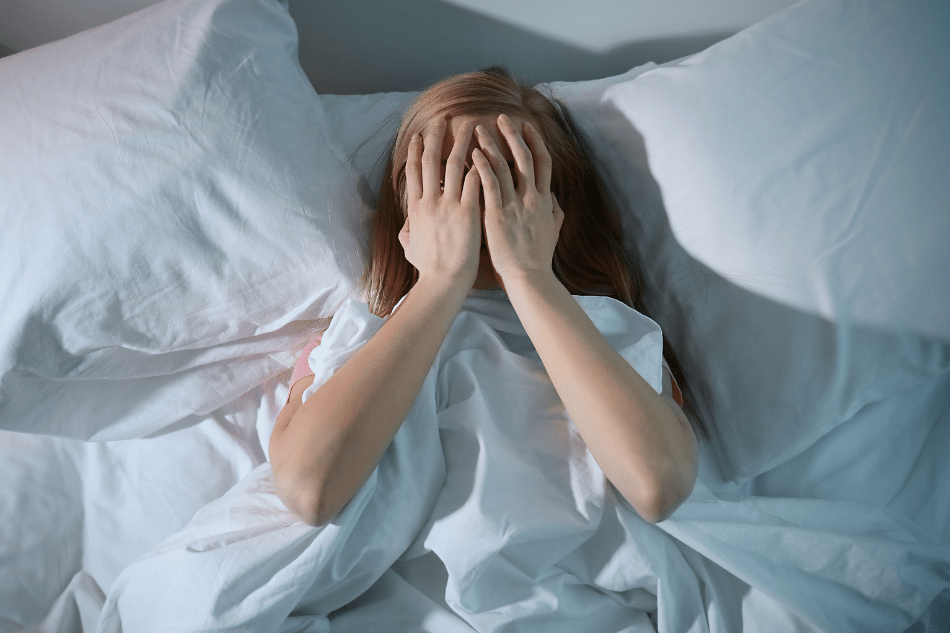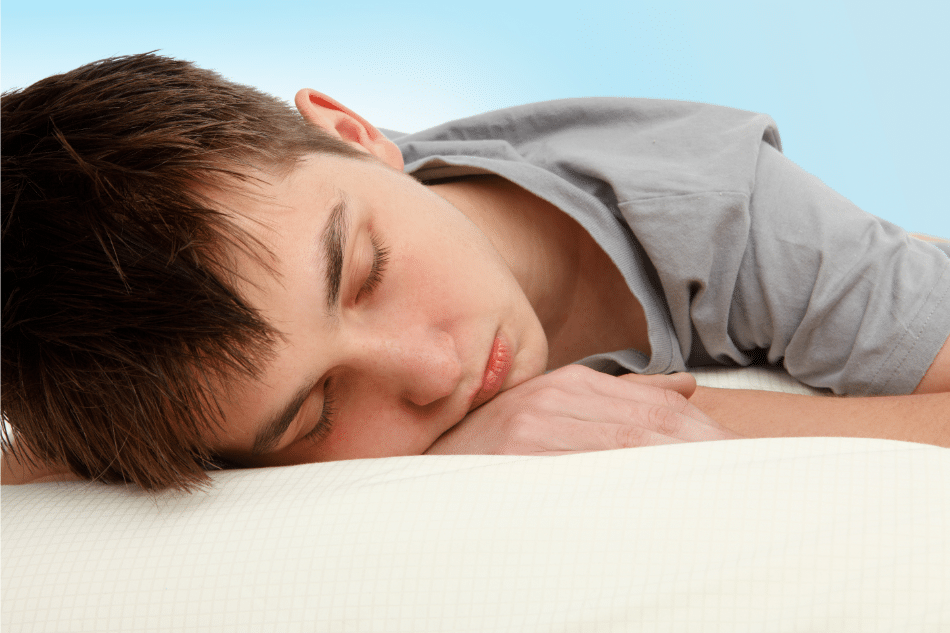Temazepam (Restoril) for Adolescents: Dosage, Uses, and Side Effects

What if falling asleep felt like slowly turning down the volume on your thoughts until everything just…fades out? Sleep issues in teens are more common than ever, with over 70% missing out on the vital sleep they need.1
Academic stress, screen time, and hormone changes can make it tough to get a good night’s rest. While lifestyle changes are the first step toward better sleep, some adolescents might be prescribed sleep medications like temazepam. But what is it? And what should parents and teenagers know before taking this medication?
On this page, we’ll look into temazepam for teen sleep disorders – how temazepam works, its benefits and side effects, and why caution is key. So, whether you’re a teen looking for answers, or a parent wanting to help their teen, this guide will give you the clear and honest facts that you need.

What Is Temazepam?
Temazepam, also known by its trade name Restoril, is a type of medicine called benzodiazepine. It’s used short-term to treat insomnia.2 But how does it do that?
Imagine that your brain is like a stereo system. When you are stressed, anxious, or just can’t sleep, the volume is cranked up to the max. Thoughts are loud, and worries play on repeat. Temazepam turns down the volume in your brain. It works on a calming brain chemical called GABA, which is a bit like a “mute button” for the brain. It slows down your thoughts and relaxes your body so you can fall asleep easier.3
But in the same way that turning the volume down too low can make things seem too quiet, taking too much temazepam or using it too often can make you feel groggy. That’s why it’s only used short-term.
Temazepam has received approval from the U.S. Food and Drug Administration (FDA) for short-term treatment of insomnia in adults, and they mean short term – a week or two, not months. It may also be prescribed on a short-term basis to help with panic and anxiety disorders. However, it’s important to note that the safety and effectiveness of temazepam in children and teens haven’t been proven, so Restoril for treating insomnia in teens should be used with caution.
What Is Restoril Used for in Teens?
Restoril isn’t often given to teens, but when it is, it’s usually for sleep problems. Temazepam for improving sleep quality in teens is an option if you have really bad, short-term insomnia that doesn’t get better through things like sleep routines, therapy, or melatonin.
When we talk about insomnia, it means problems falling asleep, staying asleep, or sleeping enough. You may also wake up lots during the night if you struggle with insomnia.
Temazepam can be used to help break the cycle of poor sleep, like a bit of a shakeup to your body’s sleep schedule. Sleep problems don’t necessarily exist on their own in a bubble – you may be prescribed temazepam for treating stress-related insomnia in teens, or if your poor sleep is linked to anxiety or depression.
As Restoril is sometimes prescribed short-term to treat panic and anxiety disorders, your doctor may also discuss the possibility with you about using temazepam for teen anxiety and sleep.3
Temazepam Dosage for Adolescents
Temazepam usually comes in the form of a capsule or tablet to be taken at night. The reason for this is that you will likely feel sleepy very quickly after taking it.
For adults, the recommended starting dose is 15 mg, according to the American Academy of Sleep Medicine.4 For adolescents, however, the starting dose will be decided by your doctor, as there are no recommended doses for children or teens. Your doctor can then increase or decrease the dosage as needed to help you get the best results for your sleep.
Benefits of Temazepam
Let’s take a look at some of the benefits you can expect when you take temazepam for sleep disturbances in teens with anxiety. Temazepam has two key benefits:
It can help you to fall asleep quicker – we’re talking half an hour
- It can help you to stay asleep for seven to eight hours.5
Getting some good quality sleep can help you to feel more rested, especially if you’ve been stuck in a cycle of poor sleep for some time now. So, this is another after-benefit of taking temazepam.
Temazepam Side Effects for Teenagers
All medications come with the potential for side effects, including temazepam. Side effects are the unintended things that can happen to you when you start taking medicine. For example, the main effect of an allergy tablet would be to stop your skin itching or to stop you from sneezing, but it may have a side effect of making you feel drowsy. Side effects are usually temporary while your body and brain get used to something new being in your system.
Some people don’t get any side effects when they start taking temazepam, and other people notice some changes, so it’s important to know what to look out for. Whether you are taking temazepam for depression-related sleep issues in adolescents or for other types of insomnia, some of the most common side effects are:5
Feeling groggy the next day
- Feeling drowsy
- Dizziness
- Nausea
- Headache
Studies have shown that if adults get up too soon after taking Temazepam, they might have some memory problems. The link between Temazepam and memory problems in teens hasn’t specifically been shown due to lack of research, but it is good to know what to watch out for.
It’s important to attend any reviews you have booked with your doctor so that you can keep them updated on how the Restoril is working. If you find your sleep is still a problem while taking it, or if you notice any changes to your moods or thoughts, or notice side effects, this is when you can contact your doctor and get advice about the next steps to take.
Risks of Temazepam Use in Teens
As well as side effects, there are potential risks that come with using temazepam:6
Suicidal Thinking and Behavior: Temazepam can increase the risk of suicidal thinking and behavior in those aged under 25 years. When you start taking this drug, keep a watchful eye for any signs of worsening mood.
- Dangerous Effects With Opioid Use: Using Temazepam with medicines such as codeine can cause dangerous effects, so it’s important to always tell your doctor about any other medications you are taking.
- Severe Drowsiness – you may still feel drowsy the next day.
This may sound worrying, especially if it’s the first time you are reading these warnings. However, if you are prescribed Temazepam, your doctor will have looked at the pros and cons of taking the medicine and decided that the benefits outweigh the risks.
It’s vital to keep your doctor informed of any changes, especially regarding suicidal thinking and behavior. Signs to look out for in your teen include:
Talking about suicide
- Self-harm
- Agitation or irritability
- Aggression
- Worsening depression or anxiety
- Impulsiveness
If your teen shows any of these symptoms, you must seek help immediately and let your doctor know what has happened. Then they can look at either changing the dose or the medication altogether.
Stopping Temazepam Safely for Teenagers
It’s vital to always take your medicine as directed by your doctor, and this includes when you decide to stop taking it. The reason behind discussing this with your doctor is that there are risks associated with stopping temazepam treatment suddenly.
If you suddenly stop taking it, your sleep problems may not get better, and you may feel some effects from the drug levels suddenly dropping in your system. This is known as a withdrawal effect. Temazepam withdrawal symptoms in adolescents can include:6
Feeling shaky
- Seizures
- Stomach cramps
- Sweating
- Vomiting
This is why it’s so important for your doctor to be involved when you stop taking the medicine – they can help you reduce it slowly and in a controlled way so that you can avoid experiencing any of the nasty withdrawal effects as much as possible.
If you are taking any of these medications, it’s okay. Your doctor will guide you on the best course of action – whether this is trading one opioid medication for another, or swapping temazepam for a different medication.
Temazepam vs Other Sleep Medications for Teens
There are many options when it comes to sleep medications for teens. Let’s take a quick look at the different types available:
Melatonin: Your body naturally produces melatonin, a chemical that is released when it’s time to go to sleep. You could take melatonin to provide a boost when it’s close to bedtime to remind your body to start preparing for rest.
- Sedative Antidepressants: For example, trazodone. These are antidepressants that also make you feel sleepy. They can be useful if you experience mood challenges as well as insomnia.
- Antipsychotics: Like quetiapine. These are primarily used to treat conditions such as schizophrenia and also have a sedative effect.
- Nonbenzodiazepines: For example, zolpidem. This helps you to fall asleep quickly and makes you less likely to wake up during the night.
In addition, there are always alternatives to medication for sleep. You could consider:
Lifestyle Changes
: Reducing stress, cutting out caffeine, and exercising can all work wonders for your sleep.
- Sleep Hygiene: Create a good sleep routine to get your mind and body prepared for rest. Lower the lights, avoid bright screens before bed, and do a calming activity like reading or listening to music. Creating a consistent routine can help the body and brain recognize the signs that lead up to bedtime and prepare for rest.
- Herbal Remedies: Some people find the smell of lavender or the taste of chamomile tea relaxing. See if there is something that helps you to wind down ready for bed.
- Therapy: If you struggle to sleep because of anxiety or depression, then therapy could be a good option for you. Therapies like cognitive behavioral therapy can help you to understand yourself better, recognize things that may be contributing to your problems, and teach you better ways of coping. By treating the reason behind the insomnia – the anxious worries keeping you awake, for example – you can help put it to bed permanently.
Finding Professional Support at Mission Prep
No one can deny that you feel better after a good sleep. Getting the rest you need is essential for good mental health, but not everyone can drop off to sleep so easily. This is where lifestyle changes, therapy, and medications step in to give you some extra help.
If you’re a parent and you’re worried about a teen, or you’re a teen looking for support with sleeping problems caused by your mental health, Mission Prep can guide you through the options available. Here at Mission Prep, we are dedicated to helping teens overcome mental health challenges, including sleep issues. We know there isn’t a one-size-fits-all approach to mental health, which is why we offer a wide range of treatment options, to ensure you are supported in the way that feels best for you.
Whether you are looking for round-the-clock care through a residential treatment program, outpatient services like CBT to help you work through your challenges or something in between, we will create a completely individualized plan to help you reach your mental health goals.
We know that cost can be a concern for families, which is why we offer a range of payment options to make treatment accessible. These include insurance, private pay options, finance plans, and sliding scale fees based on financial need.
If you’re ready for peaceful nights and refreshed mornings, get in touch today to find out how we can help you.

References
- Centers for Disease Control and Prevention. (2024, May 15). FastStats: Sleep in high school students. https://www.cdc.gov/sleep/data-research/facts-stats/high-school-students-sleep-facts-and-stats.html
- American Psychological Association. (n.d.). Temazepam. APA Dictionary of Psychology. https://dictionary.apa.org/temazepam
- Fluyau, D., Ponnarasu, S., & Patel, P. (2024, January 11). Temazepam. In StatPearls. StatPearls Publishing. https://www.ncbi.nlm.nih.gov/books/NBK599496/
- Sateia, M. J., Buysse, D. J., Krystal, A. D., Neubauer, D. N., & American Academy of Sleep Medicine. (2017). Clinical practice guideline for the pharmacologic treatment of chronic insomnia in adults: An American Academy of Sleep Medicine clinical practice guideline. Journal of Clinical Sleep Medicine, 13(2), 307–349. https://aasm.org/resources/pdf/pharmacologictreatmentofinsomnia.pdf
- MedlinePlus. (n.d.). Temazepam: MedlinePlus drug information. https://medlineplus.gov/druginfo/meds/a684003.html
- University of Illinois. (2021, August 11). Temazepam, oral capsule. Healthline. https://www.healthline.com/health/drugs/temazepam-oral-capsule













